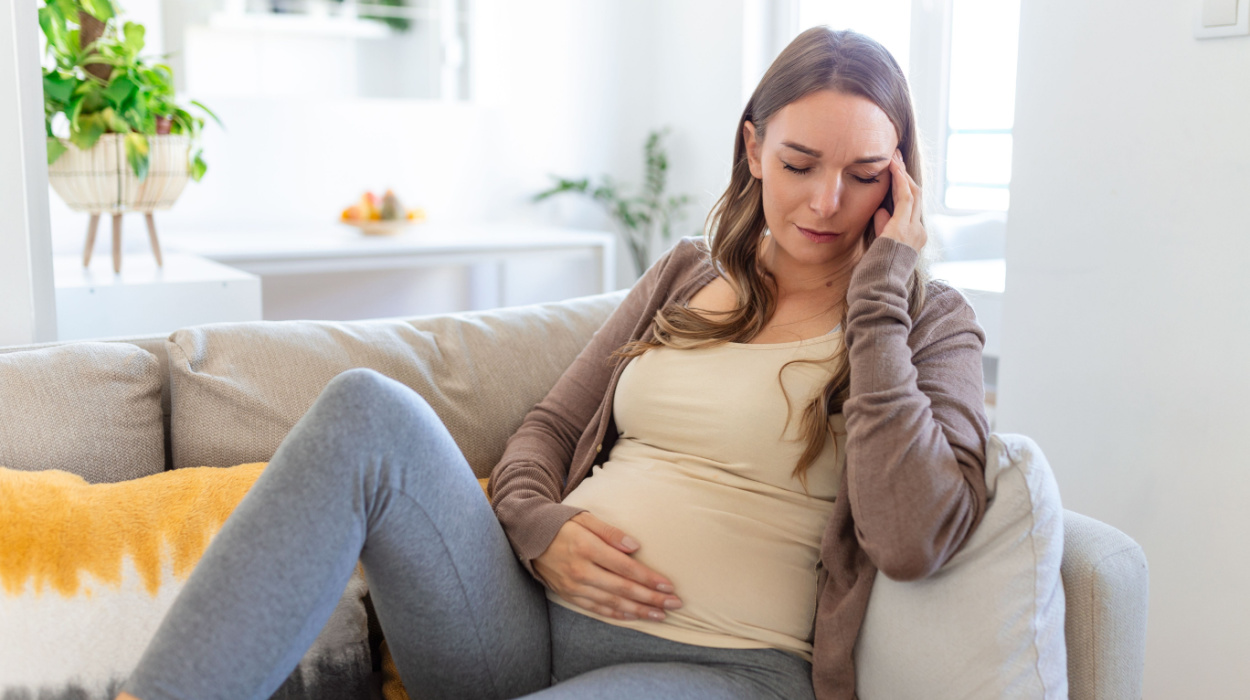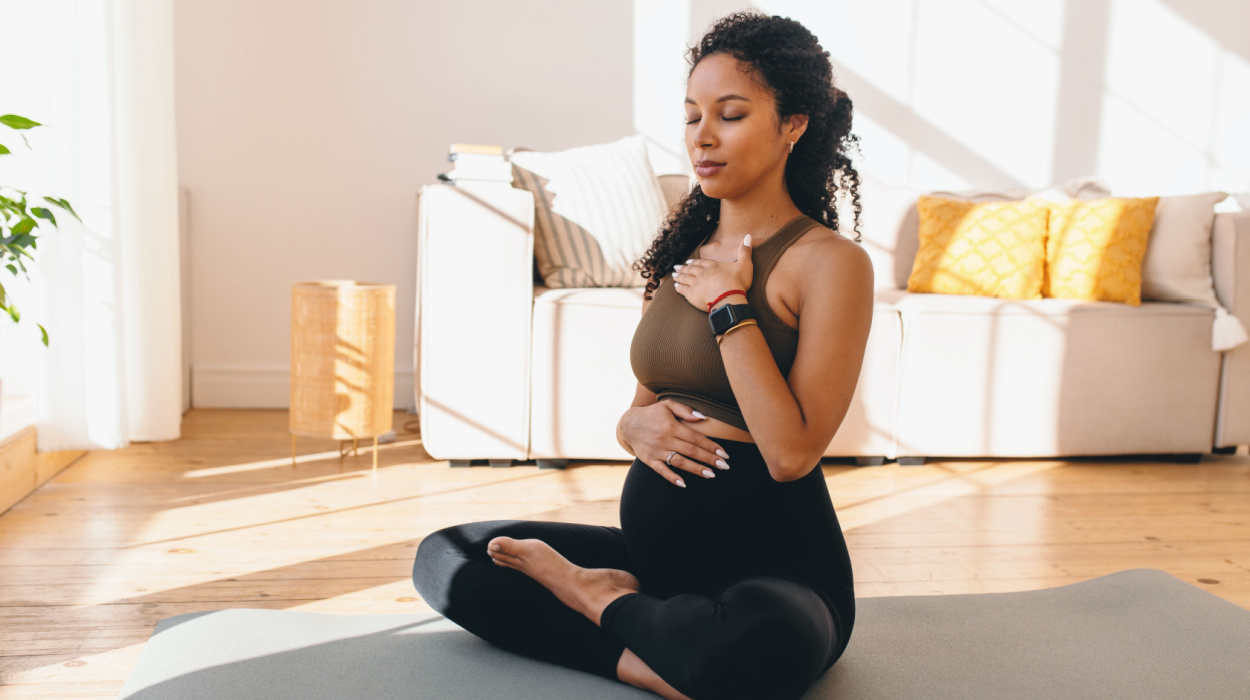 Author's opinion
Author's opinion
Anxiety & Pregnancy 2023: What Can You Do When Worry Overwhelms You?

Anxiety in pregnancy can be devastating, but there are things you can do to feel better. Photo: Photoroyalty/Shutterstock
Will Having Anxiety During Pregnancy Affect Your Baby?
Having anxiety in pregnancy may be associated with some adverse outcomes for babies. There is an association between anxiety and both preterm birth[1] and low birth weight. Preterm birth, in turn, can have a variety of long-term effects[2]. These may include more hospital stays during childhood, cognitive and sensory deficits, behavioral problems, and physical health problems which may include chronic kidney disease, high blood pressure, impaired lung development, and impaired growth. This is not a reason to worry more, but rather a reason to find ways to manage your anxiety for your well-being and that of your entire family. You can do this!
Anxiety & Pregnancy
Anxiety is a common but challenging experience that many pregnant women face. It can range from increased worry about the health of your pregnancy and baby to an anxiety disorder requiring treatment, or even panic attacks that make it hard to enjoy your pregnancy. Read on for information about antenatal anxiety and what you can do to manage it.
What Is The Link Between Anxiety And Pregnancy?

There are many potential risk factors for anxiety in pregnancy, and the cause can vary from person to person. It goes without saying that pregnancy entails a lot of major life changes. Your family is growing, your relationships may be in flux, your finances are changing, and you are on a physical journey that will culminate in birth. You might even lose some hair! All of this together can mean a lot of stress even for someone who is well-prepared for it.
Sometimes pregnancy occurs in less-than-ideal circumstances, which can exacerbate the usual stresses of pregnancy. Some of these factors include your pregnancy history; for example, if you’ve experienced previous losses[3] or other pregnancy complications, you may be more prone to anxiety in your current pregnancy. If you have poor social support[4] in your community or relationship conflict or violence, those can cause anxiety too. And many people with a history of mental illness, including anxiety or depression, may notice a worsening of those symptoms during pregnancy.
There is also a hormonal component underlying pregnancy anxiety. Progesterone, one of the predominant hormones of pregnancy, can lead to anxiety for some people whose brains may be uniquely sensitive to it. These hormonal shifts can be difficult to handle, and may contribute to anxiety symptoms in pregnancy.
Pregnancy Anxiety Symptoms
Many people will recognize the symptoms of anxiety in pregnancy because they are similar to anxiety outside of pregnancy. One of the most common signs is finding yourself worrying more than usual. In pregnancy, this may manifest specifically as worry about the health of your pregnancy or your baby. Some women experience intrusive anxious thoughts about harm coming to them or their babies, which can increase anxiety overall.
There are physical symptoms, too: some women have difficulty sleeping, or muscle tension that may manifest as pain in the shoulders, back, or jaw. These symptoms, in turn, can worsen anxiety, causing a vicious cycle in which your anxiety causes physical pain, and your pain makes you feel more anxious. If you experience a sudden onset of physical discomforts such as a rapid heartbeat, sweating, tunnel vision, and feeling hot along with anxious thoughts, you may be experiencing a panic attack, which is the most acute physical manifestation of anxiety.
Cognitive and interpersonal symptoms are common as well. Some people find that they have difficulty concentrating. This is not the “pregnancy brain” famous for making women feel less attentive than they are at other times, but rather, a struggle to focus as a result of anxiety and distraction. Others experience irritability, or feeling “short-fused,” which can make interpersonal conflict worse and further weaken social support.
Treatment For Pregnancy Anxiety
Medical treatments for pregnancy anxiety consist primarily of medication and counseling. If you opt for medication, your midwife or doctor may recommend a type of drug called a selective serotonin reuptake inhibitor, or SSRI. This kind of medication is used to treat both antenatal anxiety and pre- and postpartum depression, is well-studied for safety in pregnancy, and is very helpful to many people.
Counseling can also be helpful for people suffering from anxiety in pregnancy. A therapist can help you develop healthy coping skills and tools[5] to confront your worrisome thoughts, replacing them with constructive and calming thought patterns. Therapy can also provide a safe space to unload whatever is bothering you and work through professional, interpersonal, emotional, and even spiritual conflicts.
Anxiety And Pregnancy: Tips For Coping With Anxiety During Pregnancy

Exercise
We’ve all heard it before, but it bears repeating: Exercise is a time-tested way to regulate your nervous system, reduce stress, and even treat anxiety. Getting in some physical movement every day is key to keeping your body and your mind calm. And exercise has additional benefits in pregnancy; it can help to ensure that your weight gain remains in a healthy range, and that your labor course is normal and healthy when that time finally comes.
Healthy Diet
Take a moment to think about how you feel mentally when you go a long time without eating, consume too much sugar or caffeine, or overeat to the point of feeling uncomfortable. Now consider how you feel when you eat wholesome foods that you find satiating , drink plenty of water, and nourish your body by eating at regular times. There’s a big difference, right?
Since anxiety during pregnancy is closely linked with physical symptoms such as shortness of breath, sweating, and a rapid heartbeat, it goes without saying that dietary patterns that cause those same symptoms can also increase your anxiety. It’s important to limit your caffeine intake, try to control how much sugar you consume, and eat a balanced diet to keep your body feeling calm while you battle anxiety. You should also be taking a prenatal vitamin to make sure you get all the nutrients you need for yourself and your growing baby.
Sleep
Poor sleep is a known anxiety trigger. People who sleep less may feel physical symptoms of anxiety directly as a result of limited sleep or as a side effect of the overconsumption of caffeine meant to overcome their sleep deficit.
Sleep can be challenging in pregnancy due to hormonal changes and physical discomforts. To help you sleep, practice good sleep hygiene. This includes limiting artificial light in the hour before bedtime, sleeping in a cool and dark room, and trying not to expose yourself to stressful triggers like distressing TV shows or news just before bed.
Mindfulness
Mindfulness-based stress reduction is a widely used technique, not only for reducing anxiety, but for improving overall quality of life. It requires no equipment and very little training, but that doesn’t mean it’s easy – in fact, living in the moment and taking in each new sensation mindfully can take a lot of practice. That said, there’s no better time to start than during pregnancy if you’re experiencing antenatal anxiety. There are a multitude of guides out there that can teach you mindfulness – check out the many resources on the web and you can start calming your body and mind right now!
Talk To Your Midwife Or Doctor
Severe anxiety that is interfering with your ability to live your daily life merits the attention of a midwife or doctor experienced in women’s mental health. If you find that you’re not able to go to work or school, or your loved ones are telling you they’re concerned about your anxiety, talk to your provider as soon as possible. You don’t have to suffer with anxiety in pregnancy.
Conclusion
Pregnant women commonly experience a whole host of new emotions and physical sensations during their pregnancy journey, and unfortunately anxiety is one of the most common. The good news is that you can do a lot of things on your own to help calm your anxiety and set yourself and your baby up for success. Give yourself grace to move through this transition with all of the feelings it brings, and you’ll soon find yourself not only managing your anxiety, but also in possession of the skills to gently mother your child through their own journey of life.
Frequently Asked Questions
Although antenatal anxiety increases the risk of preterm birth and low birth weight, it’s important not to let this worry you further; this can quickly become a vicious cycle! So the answer is yes, but more importantly, there are steps you can take now to manage anxiety and protect your baby.
Yes. These medications are well-studied and safe to use in pregnancy for mothers with anxiety disorders.
Anxiety, when diagnosed as a disorder that is interfering with your life, does qualify as a mental health condition. It also has real physical side effects, so treating it involves treating both your mind and your body.
Pregnant women who are experiencing stressful life events, who have had previous emotional or behavioral challenges, or who lack social support are those most likely to experience antenatal anxiety.
Resources
MANA adheres to strict sourcing guidelines and abstains from utilizing tertiary references. We rely on peer-reviewed studies, academic research from reputable medical associations and institutions to ensure the accuracy of our articles. For more information regarding our editorial process, please refer to the provided resources.
- Grigoriadis, S., Graves, L., Peer, M., Mamisashvili, L., Tomlinson, G., Vigod, S.N., Dennis, C., Steiner, M., Brown, C., Cheung, A., Dawson, H., Rector, N.A., Guenette, M. and Richter, M.A. (2018). Maternal Anxiety During Pregnancy and the Association With Adverse Perinatal Outcomes. The Journal of Clinical Psychiatry, [online] 79(5). doi:https://doi.org/10.4088/jcp.17r12011.
- Thuy Mai Luu, Muhammad and Anne‐Monique Nuyt (2017). Long-Term Impact of Preterm Birth. Clinics in Perinatology, [online] 44(2), pp.305–314. doi:https://doi.org/10.1016/j.clp.2017.01.003.
- Hamideh Bayrampour, Ali, E., McNeil, D., Benzies, K., MacQueen, G. and Tough, S. (2016). Pregnancy-related anxiety: A concept analysis. International Journal of Nursing Studies, [online] 55, pp.115–130. doi:https://doi.org/10.1016/j.ijnurstu.2015.10.023.
- Biaggi, A., Conroy, S., Pawlby, S. and Pariante, C.M. (2016). Identifying the women at risk of antenatal anxiety and depression: A systematic review. Journal of Affective Disorders, [online] 191, pp.62–77. doi:https://doi.org/10.1016/j.jad.2015.11.014.
- Domínguez-Solís, E., Lima‐Serrano, M. and Joaquín Salvador Lima-Rodríguez (2021). Non-pharmacological interventions to reduce anxiety in pregnancy, labour and postpartum: A systematic review. Midwifery, [online] 102, pp.103126–103126. doi:https://doi.org/10.1016/j.midw.2021.103126.






